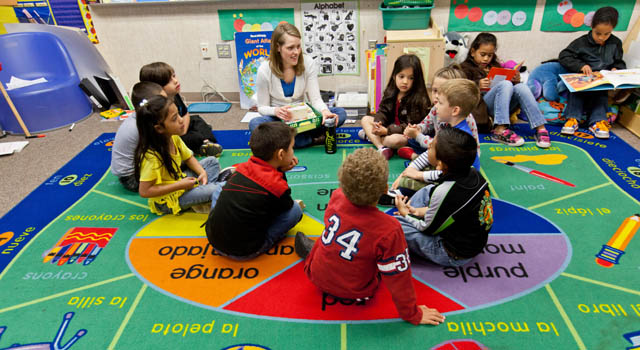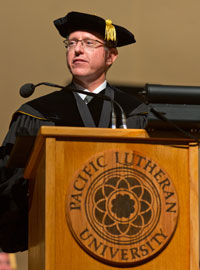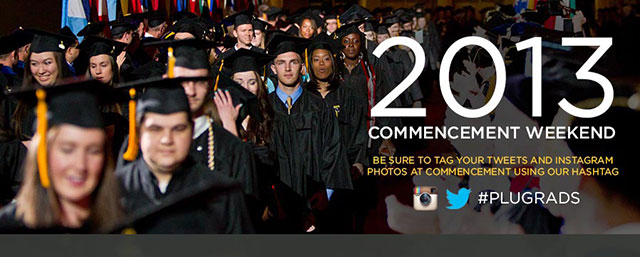Page 51 • (509 results in 0.092 seconds)
-
called the PLU Corporation, which confirms the members of our governing body, the Board of Regents. We assemble this distinguished company to welcome you to the serious and noble work of this University—and to pledge our commitment to your success. It is a rite of passage inviting you to subscribe to the mission and common values of this place: Thoughtful inquiry, service, leadership and care – for other people, for their communities and for the Earth. The values that have shaped this university
-
prepare one for a life of “thoughtful inquiry, service, leadership, and care.” Writing 11 years later, with continuing economic and social uncertainty, I must also report that we’ve faced serious budgetary challenges at PLU, which have had a profound impact on the humanities. Next year we will sadly not be offering degrees in Classics, German, or Nordic Studies. All of our programs have seen reductions, and this spring some colleagues are completing their final year of teaching earlier than they had
-
the media appeared to be paying it much attention at this stage. (As an example, a Google search of “global health” back then turned up mostly Seattle Post-Intelligencer stories. That’s certainly no longer the case.) Since then, of course, the world has taken notice of the Gates Foundation’s rapidly expanding leadership on many fronts of global health. It should be noted, however, that not everybody has been happy to ascribe to Gates the reinvigoration of this once-neglected field in human health
-

Scholarship; PLU Academic Scholarship; First in Family Scholarship; Donald R. Farmer Award; Lutheran Leadership Award; Sigma Tau Delta English Honor Society; Phi Theta Kappa Honor Society Post-graduation plans: Pursuing graduate study in international relations; founding an organization to promote immigrant voter participation in Washington state “I’ve never been a traditional student,” said Nelago Nuunyango, “but I’ve seen traditional students struggle.” One of nine children of a subsistence farmer in
-
for the same reasons. The ties that bind faith communities can do so in different ways and with varying degrees of strength and consent. What kind of faith community was Le Chambon? At first glance it might seem that Le Chambon was a homogenous community of Huguenot Christians who lived largely isolated from the outside world, but on closer inspection the situation is more complex. The village was mainly French Huguenot and much of the leadership came from the pastors, Andre Trocme and Eduard
-

another. They asked, and Schroeder said come up with a proposal – a bracket, how long games would go, how teams would be organized, outreach to other classes to find out interest – all the trappings of organizing a basketball tournament. “It’s cool to see them take ownership of their school that way,” Edwards said. “They are taking a leadership role they haven’t taken before.” The students made a proposal and presented their idea to Schroeder, who approved it. Needless to say, Edwards has a little
-

ensuring their education, and for fostering leaders committed to service to others finds itself well represented in PLU’s mission statement: We seek to educate students for lives of thoughtful inquiry, service, leadership, and care—for other people, for their communities, and for the earth. At PLU today, our distinctive expression of American higher education includes a superb liberal arts curriculum—with its stellar faculty and students in the sciences and social sciences, in the humanities, in music
-
small groups in which the quieter students feel more comfortable and may participate more freely, but the dynamics are once again significantly altered by the presence or absence of men. Men dominate small groups even more effectively than the class as a whole; small group projects usually reflect male interests, and the women almost always defer to male leadership. A significant problem in foreign language classes is the issue of authority for women teachers. Nurturing behavior is almost
-

totaling up the points, my head finally knew what my heart had known all along: PLU was the best choice for me. My PLU experience: Over the past four years, I made life-long friends, challenged myself, and grew more than I thought possible. Rigorous work in the biology department and across campus has prepared me for a future in healthcare. Co-curricular involvement has enhanced my understanding of society, diversity, and leadership. My involvement with the Office of Residential Life, Office of
Do you have any feedback for us? If so, feel free to use our Feedback Form.


